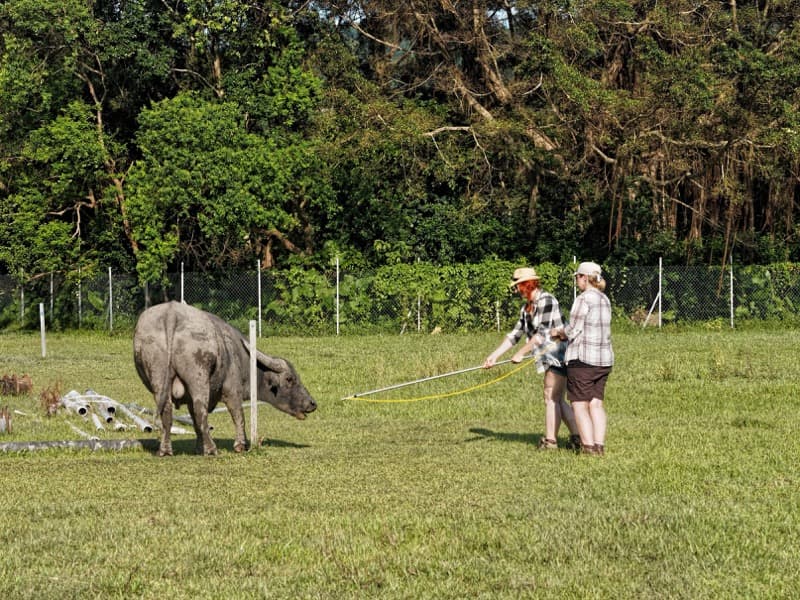Worldwide, there are many developments in robotics, several of which are weirder and wackier than a talking version of a dead novelist and a robot board member.
In May 2013, Hong Kong became the base of Hanson Robotics, a company that was founded in the US to develop and manufactures bio-inspired technologies for humanlike robots, complete with naturalistic rubber skin, and neuro-inspired artificial intelligence. Its website featured a video with a robot version of science writer Philip K. Dick, telling a smiling interviewer, “Don’t worry, even if I evolve into Terminator I will still be nice to you.”
While the wires protruding from the back of the head show the Dick robot is far from becoming akin to the Terminators of movie fame, it is part of a fast evolving, wide ranging field. Elsewhere in Hong Kong, May also saw venture capital fund Deep Knowledge appoint a robot to its board. A robot of sorts, that is: rather than moving, the new board member is a machine learning program capable of making investment recommendations.
Worldwide, there are many more developments in robotics, several of which are even weirder and wackier than a talking version of a dead novelist and a robot board member. Some are comical, a few are downright scary.
Perhaps the scariest is South Korea’s SGR-1 robot sentry. Developed by Samsung Techwin, this stands around half the height of a human yet may be more than a match for any gunslinger. There’s no rubber skin, no attempt to resemble a person. Instead, it totes a machine guns plus a grenade launcher, which can be swivelled and aimed based on input from heat and motion sensors capable of detecting humans up to two miles away.
Though a promotional video recalls scenes from Robocop, there’s no concern that SGR-1 might become self aware and rampage against its creators, as it requires a remote human operator to give permission to open fire. Since 2006, an undisclosed number of these sentries now keep watch along the border between North and South Korea. They’re never lazy, never lose concentration, and are always watching.
To you and me, the robot sentry might seem downright sinister. Yet Samsung Techwin spokesman Huh Kwang-hak was quoted in the Daily Mail as saying, “The SGR-1 can and will prevent wars”.
I guess Kwang-hak would see potential for even greater “war prevention” in a robot that researchers at MIT unveiled this week. Dubbed a robotic cheetah, this is roughly the size of a family dog, and can run at up to 10 miles per hour as well as leap over foot-high hurdles. Though still slow compared to humans, the researchers think they can triple its speed, making it more than a match for sprinter Usain Bolt. Perhaps we’ll soon see a dystopian movie featuring a platoon of machine-gun equipped cheetah robots, rampaging across the land to enforce order according to the whims of their programmers.
Happily, such scenes are still restricted to science fiction. Yet last month came a glimpse of how multiple robots can act in concert. A Harvard University team showed off a swarm of tiny robots, each a few centimetres across, which can organise themselves to form two-dimensional shapes like a star or the letter K. With each robot only able to communicate with and measure distances from each of its neighbours, the robots collaborate with one another until the overall pattern is created. Noting similarities with biological systems, lead researcher Radhika Nagpal, Fred Kavli Professor of Computer Science at the Harvard School of Engineering and Applied Sciences, said, “At some level, you no longer even see the individuals; you just see the collective as an entity to itself.”
Robots are also working with people. Collaborative robots now roam some factories, performing a variety of tasks that were too onerous for humans, who might be free to perform other duties – or free to seek work elsewhere. These are smaller and cheaper than the large robots that hitherto featured on production lines, and instead of being caged for safety reasons, they have sensors so they can slow down or halt if a collision appears likely. One of the best known collaborative robots is called Baxter, and even has a computer screen to signal “emotions” such as puzzlement.
Boris struggles with knives and forks
While if you would someday like help with the housework, take note of Boris. This is a new British robot that can assess unfamiliar objects, and determine how best to pick them up with a five-fingered hand on a robotic arm. Though billed as being one day able to load a dishwasher, Boris copes well with cups and plates, while struggling with knives and forks.
So far, all robots have had to be taught or learn for themselves about such objects. That could change, with a project using cloud technology. Aiming to create a wealth of knowledge in the cloud, for access by robots, the project is called RoboBrain. If you’ve seen any of the Terminator films, you may immediately think of similarities with Skynet, the artificial intelligence that controlled defence systems and one day unleashed them against the human race. For now, though, RoboBrain is far more basic, and you can visit the website to find it has recently learned information such as how to grasp an umbrella or a mouse, and the appearance of a heatmap for a seated human who is reading a book.
With developments snowballing, scientists including renowned physicist Stephen Hawking recently warned of the potential perils of artificial intelligence. In an article for the Independent newspaper, they wrote that there are no fundamental limits can be achieved, adding, “So, facing possible futures of incalculable benefits and risks, the experts are surely doing everything possible to ensure the best outcome, right? Wrong.” Little serious research is being conducted regarding the pitfalls; yet now is the time to ask how to improve the chances of reaping the benefits and avoiding the risks.
While risks from killer robots loom large in the popular imagination, it is even possible that some of us humans will become like robots’ sex slaves. Robot girlfriends have already appeared, albeit at least one simply lies still, though talks when touched. Today, Professor Adrian Cheok of City University London is giving the keynote talk during the Festival of the Mind, on “telepresence” technologies which will blend the virtual and the physical and may even result in sexual and emotional relationships between humans and robots.
As you ponder where such things may lead, I’m more concerned about research finding robots can concoct passable news reports. Yikes! Could this mean my byline will someday vanish, replaced by the tireless, utterly objective science writer, RoboDoc?
Early warnings of climate change
While climate change resulting from human activities might seem a new-fangled concept, there have been on-point predictions dating back many years.…
Ignoring Science Makes Global Climate Disaster as Inevitable as Titanic Submarine Implosion
Climate change has been prominent in worldwide news this summer (2023), notably as we have just lived through the hottest week…
Have you been bullied into health? Fear, quackery and Covid
So here we are with our modern-day wonder, the internet – where even with a smartphone, you can search for and…
Never mind the antimask-o-sphere. Science shows face masks help reduce Covid spread
Just had one of those silly Twitter “conversations” with someone who had position so fixed, impossible to change with facts. Yeah,…
A Covid scrapbook: snapshots from the crazy pandemic
I’ve read accounts of the Spanish Flu, which was the last major pandemic, mainly in 1918 [so over and done with…
Highly pathogenic bird flu variants mostly evolve in intensive poultry farming
Highly pathogenic bird flu variants evolve from regular, low pathogenic, bird flus, within intensive poultry farming.
Keep Your Underpants Duck Taped and Air Clean as Covid Wild Ride Continues
We’ve learned a lot about Covid, even developing vaccines. Yet Covid remains an issue, no matter how much we might wish…
Covid is airborne so ventilation and air filtration are important
Since early in the pandemic, I’ve been seeing scientists arguing Covid is airborne, even with hashtag #covidisairborne – including to counter…
Long Covid – info and links indicating major impact
Evidence is snowballing that Long Covid is also a serious issue, even affecting people in whom the disease initially appeared mild.
Perhaps Covid arose through lab leak of tweaked bat Coronavirus
Maybe humans tweaked bat coronaviruses in gain of function experiments, inadvertently creating Covid thro lab leak.
The Covid Conundrum: Endless Lockdowns, Let It Rip … or What?
Covid is airborne, which means that much as unprotected sex is a risk for HIV, unprotected breathing might result in Covid.
Science shows Covid including Omicron is Really Not the Flu
Some of the science showing Covid including Omicron is a huge issue; and one that looks set to be with us…
“Alarmist” Covid predictions outperform Covid deniers’ soothsaying
The disinfo downplaying Covid is often from rightwing, mainly money-minded folks who perhaps don’t care too much about actual people.
Covid virulence, vaccines and variants
Science can provide some insights into what may happen with Covid, along with ways to limit its impacts.
We’re in the Covid Era for the Long Haul
We’re in this for the long haul, with the virus like a relentless, invisible foe, ready to exploit errors, slip through…
My Strange n Surprising Summer Staycation with Cellulitis
rom quick pricking by unseen marine creature, to intense fever, and hospital stay for an infection deep within the skin.
Covid virulence, vaccines and variants
[Written for South China Morning Post on 6 January 2021] In January last year, as reports were emerging of the new…
The Viral Time Bomb – Pandemic of Our Time
Guan Yi, director of the State Key Laboratory of Emerging Infectious Diseases at Hong Kong University, has extensive experience of viruses;…
From China With Fear: the Wuhan Coronavirus Won’t Kill Us All
As news of Wuhan coronavirus emerges, evolutionary biology suggests potential for a pandemic, not killing high percentage of people.
Fightback Needed as Science and Life Support System Under Attack
Environmentalism is under assault; yet this planet is the only home we have; providing our food, air, water… It’s our life…
Secret World of Hong Kong Water Supply
Hong Kong’s water supply system has been vital to its development as a “world city”.
Hong Kong Belching Buffaloes n Bubbling Paddies and the Mystery Methane Rise
Prof Euan Nisbet leads a science team to Hong Kong in quest to help find why levels of potent greenhouse gas…




















